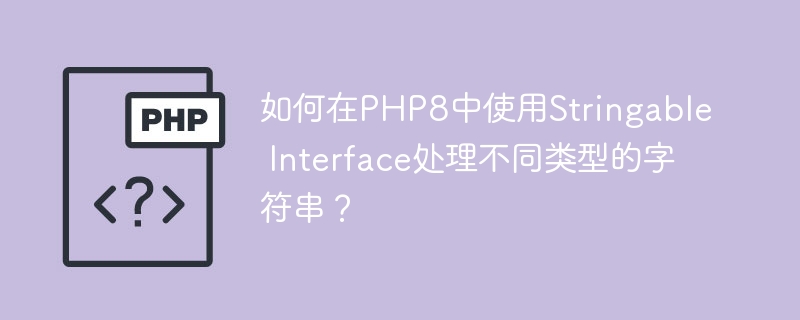Home >Backend Development >PHP8 >How to use Stringable Interface to handle different types of strings in PHP8?
How to use Stringable Interface to handle different types of strings in PHP8?
- PHPzOriginal
- 2023-10-19 09:03:21794browse

How to use Stringable Interface to handle different types of strings in PHP8?
In PHP, string is one of the most commonly used data types. The Stringable interface was introduced in the PHP8 version, which defines a __toString() method so that any class that implements the Stringable interface can be treated as a string. This provides a more flexible and unified way for us to handle different types of strings.
Before using the Stringable interface, we often need to determine whether an object can be processed as a string through multiple conditional judgments. With the Stringable interface, we only need to let the object class implement the Stringable interface and implement the __toString() method. Let's introduce in detail how to use Stringable Interface in PHP8 through some code examples.
First, let’s define a class that implements the Stringable interface:
class CustomString implements Stringable
{
private string $value;
public function __construct(string $value)
{
$this->value = $value;
}
public function __toString(): string
{
return $this->value;
}
}In the above example, the custom string class CustomString implements the Stringable interface and implements __toString( ) method, which returns the string value of the $value attribute.
Next we can use this custom string class:
$string = new CustomString("Hello, World!");
echo $string; // 输出:Hello, World!As shown above, we can directly use the echo statement and the custom string class object to output strings. No additional judgment and conversion are required.
In addition to the custom string class, PHP8 also provides support for the Stringable interface for the built-in string type. For example, we can use the Stringable interface to process date and time information in a DateTime object:
$date = new DateTime(); echo $date; // 输出:2021-09-10 12:34:56
In the above example, the DateTime object implements the Stringable interface and provides the default __toString() method, which Returns the formatted date and time string.
At the same time, the Stringable interface can also handle multiple types of strings. For example, we can also use the Stringable interface to process strings in array objects:
$data = ["name" => "John", "age" => 30];
echo json_encode($data); // 输出:{"name":"John","age":30}In the above example, when the array object $data is passed to the json_encode() function, since the array class implements the Stringable interface, And provides the __toString() method, so the function will automatically call the __toString() method to convert the array into a string output in JSON format.
To sum up, it is very convenient and flexible to use the new Stringable interface in PHP8 to process different types of strings. By implementing the Stringable interface and providing the __toString() method, we can handle different types of strings uniformly without additional judgment and conversion. Whether it is a custom string class, a built-in string type, or strings in other objects, they can all be processed uniformly through the Stringable interface. This provides a more convenient and consistent way for our program development.
The above is the detailed content of How to use Stringable Interface to handle different types of strings in PHP8?. For more information, please follow other related articles on the PHP Chinese website!

